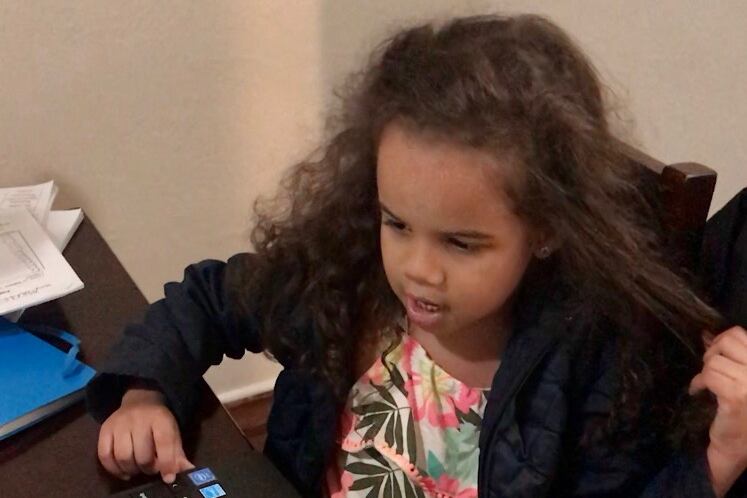Some New York City students may soon find themselves without internet as free 60-day internet deals begin to expire.
Families who face financial hardships fear losing the connection that enables online learning before the academic year is over — and before summer school even begins.
“I am very concerned that they are going to be cutting off the service because I’m not sure what this would mean for my daughter,” Katherine De La Rosa, the mother of a first-grader at Zeta Charter School Inwood 1, told Chalkbeat in Spanish through a translator.
The family’s free internet service is expected to be cut off on Saturday, even though school doesn’t end for another four weeks. “My daughter will need to continue to learn even past the 30th, and I am not sure what she will do,” said De La Rosa, noting that paying for service would be “too expensive for me at the moment, considering my financial situation.”
Both Optimum, owned by Altice USA, and Spectrum, owned by Charter Communications, announced in March that they would offer free internet access for 60 days to new customers with K-12 or college students at home due to the pandemic. As classes moved online, a high-speed internet connection became a necessity for thousands of families across New York City who didn’t have broadband access and could not afford to pay for it.
Anticipating their free service would be cut off, De La Rosa called Spectrum on May 20 to ask if the service could be extended, but a customer representative told her that wouldn’t be possible, she said. The agent instead offered alternate service plans — including one for nearly $200, she recalled — but none are feasible for De La Rosa, who has been out of work for nearly two months.
Justin Venech, a spokesperson for Spectrum’s parent company, said the company is sending letters to inform customers before the deal expires that they will be charged once the 60 days are up. Families can disconnect if they want to before the deal ends. De La Rosa said her family was never notified that the free plan was ending.
Venech also said Spectrum is “committed not to disconnect or charge late fees through June 30, for customers who tell us they are having trouble paying their bills due to COVID-19-related economic hardship.” The customer representative did not mention that to De La Rosa, she said, even though she said she explained that she couldn’t pay for service — an account similar to what Zeta Charter Schools officials said they had heard from other families.
The company’s flagship promotional internet offer is $49.99 a month, Venech said. He also said families who used the free deal and qualify for free or reduced-price lunch, attend a school that offers free lunch to all students, or receive supplemental security income are eligible for a special $15 monthly plan, known as Spectrum Internet Assist. They can sign up by calling a phone number on the letter notifying them that service is being cut off — the one De La Rosa did not receive.
De La Rosa doesn’t have an alternate internet option through the end of June or for summer school, which Gov. Andrew Cuomo has barred from happening in-person due to public health concerns. De La Rosa quit her job as a home health aide in early April after school officials told her they were worried that her daughter was falling behind in her remote studies, she said.
“This is causing a lot of stress for my family,” said De La Rosa, whose paycheck was also supporting her mother and daughter.
Bronx mother Dinorah Gomez, whose daughter Micaela also attends Zeta Charter School Inwood 1, signed up for Optimum’s free plan in early April. Unlike Spectrum, Optimum extended its free 60-day deal through the end of June as school districts announced they would close for the rest of the academic year.
But Gomez is worried about how her daughter, who is in kindergarten, will participate in summer school and does not know how the family will pay for service going forward. She works part-time as a grocery store cashier, and her husband is a maintenance worker at a shelter. Working paycheck to paycheck, they have never been able to afford internet service, which is why the free deal was a boon, she said.
Lisa Anselmo, a spokesperson for Optimum’s parent company, said the company is reaching out to customers who signed up for their 60-day deal, a plan that typically costs $14.99 a month. Gomez said the company has not contacted her.
“If customers want to stay connected, we want to work with them to find a plan or program that fits their needs so that we can continue to keep them connected for the long term,” Anselmo said. Most plans would probably force Gomez to use money from her grocery or household supplies budgets, she said.
“I don’t want to take money from food or other things that are necessary, too, but now we need it,” Gomez said. “My daughter’s education is a priority for us.”
As the pandemic has delivered massive financial hits to American industries, offering free services can be a burden or even impossible for companies. This month, both Charter and Altice reported a growth in revenue over the first three months of this year, outpacing this same time period last year. That’s in part thanks to booming broadband business, as life and learning has increasingly moved online, though both companies have warned shareholders that business could be impacted as people lose jobs and spend less.
When schools moved to remote instruction, Zeta staffers and families spent hours on the phone with both companies to sign students up for internet service, said Emily Kim, CEO of the New York City charter network. Some families were having trouble arranging appointments for the companies to set up service, while others were initially barred from the deal because they had unpaid bills — a policy that both companies reversed after Chalkbeat raised questions about the practice in March.
Searching for an emergency last resort, one Zeta staffer recalled the school had a handful of old cell phones with hotspots that they could activate and share with families, Kim said. That helped connect about a dozen families. In all, Zeta helped about 100 families connect to the internet through the deals with Spectrum and Optimum, as well as the hotspots.
For now, staff is expecting about 10 families to lose service before the school year ends. Some have turned to alternate options, such as public Wi-Fi, which can have spotty connection.
“I think it’s unconscionable to stop their service in the middle of the school year,” Kim said. “We have also decided we are doing summer school for around 140 to 180 of our kids, and we need it then, too,” Kim said, whose network is calling for Spectrum to offer service through at least the end of the academic year. Together, Zeta’s two schools, in Manhattan and the Bronx, enroll nearly 500 students in kindergarten through second grade.
This problem is likely an issue for other families who have signed up for the deals that are set to expire, either before the school year ends or before summer school starts. New York City’s district schools are in session until June 26. Summer school, which starts in July and runs through mid-August, will be remote and is expected to serve about 178,000 students.
Officials said the education department, which is facing down large budget cuts due to the economic fallout from the pandemic, is thinking through options for how it can provide internet for families that may lose service. The department is “continuing conversations” with both Spectrum and Optimum to extend service into summer months, said Danielle Filson, a spokeswoman for the education department.
The department has sent to families 290,000 internet-connected iPads that can be used over the summer, leaving about 10,000 iPads that families can still request.
“We know how critical internet access is, and we have worked hard to close the technology gap during remote learning, delivering nearly 300k iPads to students who need them,” Filson wrote in a statement. “We’re grateful that Optimum has extended their free service through the end of the school year, and we’re advocating alongside our city partners for Spectrum to do the same.”
Some nonprofit organizations have tried to fill the gap for internet service as thousands of city children struggled to get online when remote instruction started. iMentor — an organization that pairs high schoolers with mentors — sent 82 Verizon-donated hotspots to students who needed them, said Annie Forman, associate director of iMentor’s New York City partnerships.
Since March, Lower East Side Councilwoman Carlina Rivera has been calling on Spectrum and Optimum to be clearer about the terms of their offer and not exclude families with unpaid bills. On Thursday, she said she’s been pushing Spectrum to extend service through June 30. Told of De La Rosa’s situation, Rivera said she would contact the company to get answers.
“I hope that all companies will realize how important the next couple months are going to be to children’s education,” she said.







